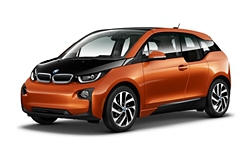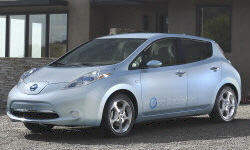

| Year and Model | % of Average Repair Frequency | |
 2014 - 2018 BMW i3 2014 - 2018 BMW i3 |
 Best
162%
Worst
Best
162%
Worst
|
See problems for this generation Share on Facebook |
 2013 - 2015 Nissan LEAF 2013 - 2015 Nissan LEAF |
 Best
41%
Worst
Best
41%
Worst
|
See problems for this generation Share on Facebook |
 2011 - 2012 Nissan LEAF 2011 - 2012 Nissan LEAF |
 Best
57%
Worst
Best
57%
Worst
|
See problems for this generation Share on Facebook |
|
Looking for a warranty? Get a quote.
| ||
| Nissan LEAF Reliability And Durability: Pros | ||
| Year | Body/Powertrain | Comment |
| 2011 | 4dr Hatch 107-horsepower Electric 1-speed automatic FWD |
One of the advantages I was looking forward to, owning a Leaf, was the fact that the power train is so much simpler than a gas powered car. These are some of the parts in a gas powered car that can't go wrong with my all electric Leaf: 1) No gears/transmission to ever slip or go out, just a gearshift knob that is really just an electric switch, with no moving parts other than the switch itself. 2) No fuel pump/filter to need maintenance on. 3) No fuel injection or carborator to go out or have problems. 4) No air filters for the motor to replace. 5) No oil to change or oil filter to replace. 6) No radiator to repair. No coolant level to check. 7) No spark plugs, cap, rotor or points to replace or maintain 8) No belts, pullies or chains to break, wear or replace. 9) No engine overheating possible. 10) No catalytic converter to replace. 11) No muffler or exhaust system to replace/maintain. 12) The electric motor acts as a generator that slows the car down when I take my foot off the accelerator and it charges the battery as I coast to a stop. Also, the regenerative breaking means that the Leaf has a generator attached to one of the rear wheels that also slows the car down as I apply the breaks and that also charges the battery as I break to a stop. This regenerative breaking and electric motor generation means that I use less of the actual breaks on the car and this improves the lifespan of my break pads. I will change the break pads and rotors a lot less often than a normal gas powered car or even a hybrid. full 2011 Nissan LEAF review |
| Nissan LEAF Reliability And Durability: Cons | ||
| Year | Body/Powertrain | Comment |
| 2011 | 4dr Hatch 107-horsepower Electric 1-speed automatic FWD |
The build quality was in line. HOWEVER, what destroys this car as a purchase choice is one thing: The cutting corners and bad engineering decisions (political or otherwise) to make the car battery air cooled. This simply doesn't work very well in warmer climates. The folks up in Seattle don't see this but where it gets above 95 degrees such as CALIF, TX, ARIZONA are the folks are starting to seeing this battery fade rapidly with pernament heat damage. Read about how to care for a LI-ON. We baby'ed this car battery for all the things we could, but the heat is getting it. This vehicle is edging toward being the orphaned 3rd car because it won't be long before it cannot do our simple 35 mile roundtrip commute. A very expensive loss for us. Learn from this and DON"T BUY THIS CAR MODEL. Buy a Chevy Volt instead. We have that car too....and we fight over who drives it. It has a conservative approach...liquid battery management to keep the battery at its favorite temperature day and night, 24/7. That temperature is 70 degrees. full 2011 Nissan LEAF review |
| Nissan LEAF Reliability And Durability: Pros | ||
| Year | Body/Powertrain | Comment |
| 2011 | 4dr Hatch 107-horsepower Electric 1-speed automatic FWD |
One of the advantages I was looking forward to, owning a Leaf, was the fact that the power train is so much simpler than a gas powered car. These are some of the parts in a gas powered car that can't go wrong with my all electric Leaf: 1) No gears/transmission to ever slip or go out, just a gearshift knob that is really just an electric switch, with no moving parts other than the switch itself. 2) No fuel pump/filter to need maintenance on. 3) No fuel injection or carborator to go out or have problems. 4) No air filters for the motor to replace. 5) No oil to change or oil filter to replace. 6) No radiator to repair. No coolant level to check. 7) No spark plugs, cap, rotor or points to replace or maintain 8) No belts, pullies or chains to break, wear or replace. 9) No engine overheating possible. 10) No catalytic converter to replace. 11) No muffler or exhaust system to replace/maintain. 12) The electric motor acts as a generator that slows the car down when I take my foot off the accelerator and it charges the battery as I coast to a stop. Also, the regenerative breaking means that the Leaf has a generator attached to one of the rear wheels that also slows the car down as I apply the breaks and that also charges the battery as I break to a stop. This regenerative breaking and electric motor generation means that I use less of the actual breaks on the car and this improves the lifespan of my break pads. I will change the break pads and rotors a lot less often than a normal gas powered car or even a hybrid. full 2011 Nissan LEAF review |
| Nissan LEAF Reliability And Durability: Cons | ||
| Year | Body/Powertrain | Comment |
| 2011 | 4dr Hatch 107-horsepower Electric 1-speed automatic FWD |
The build quality was in line. HOWEVER, what destroys this car as a purchase choice is one thing: The cutting corners and bad engineering decisions (political or otherwise) to make the car battery air cooled. This simply doesn't work very well in warmer climates. The folks up in Seattle don't see this but where it gets above 95 degrees such as CALIF, TX, ARIZONA are the folks are starting to seeing this battery fade rapidly with pernament heat damage. Read about how to care for a LI-ON. We baby'ed this car battery for all the things we could, but the heat is getting it. This vehicle is edging toward being the orphaned 3rd car because it won't be long before it cannot do our simple 35 mile roundtrip commute. A very expensive loss for us. Learn from this and DON"T BUY THIS CAR MODEL. Buy a Chevy Volt instead. We have that car too....and we fight over who drives it. It has a conservative approach...liquid battery management to keep the battery at its favorite temperature day and night, 24/7. That temperature is 70 degrees. full 2011 Nissan LEAF review |